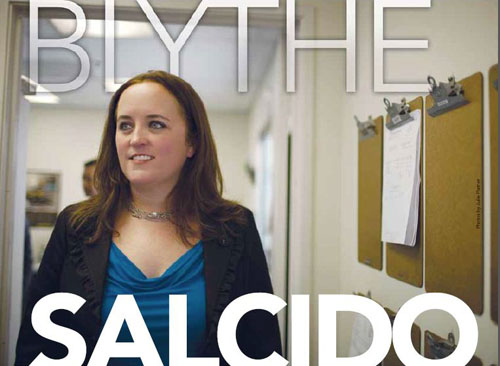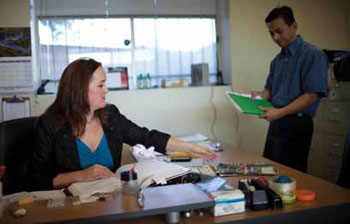
Blythe Salcido - Director of Maintenance|SunQuest Executive Air Charter


ByJoe Escobar
What does it take to be the director of maintenance at Van Nuys, CA-based SunQuest Executive Air Charter? According to SunQuest’s DOM, the job requires attention to detail, professionalism, a good working relationship with the FAA and teamwork. What it doesn’t require is being male. Not only is SunQuest’s director of maintenance a female in what can easily be called a male-dominated industry, she has managed to successfully rise up her career ladder to the position of DOM in her relatively short career. We sat down with Salcido to learn more about her work experiences and life lessons.
Getting in Aircraft Maintenance
Most DOMs can tell you how they first got interested in aviation maintenance. For many, family members had a major influence in their career decision. For Salcido, the same is true — only in a different way than usual.
When Salcido was 20, her little sister, who was a year and a half younger than she, was going to the University of California-Berkeley. She called Blythe one day. “My sister told me I needed to get my stuff together and go to school,” shares Salcido. “So I quit my job at a record store and moved from my apartment in Ventura County up to the bay area.”
Salcido moved to the bay area because she wanted to sign up for school in the area while staying with her sister. She initially thought of taking automotive classes. Salcido grew up with two sisters, and her dad had taught them how to perform basic automotive maintenance – from changing tires and oil to replacing brakes and other parts – so they could perform their own maintenance on their vehicles. She took a trip to Alameda Community College in Oakland to sign up for automotive repair classes, but walked away signing up for something else. “The school’s course offerings were listed in alphabetical order, and I noticed aviation maintenance just under automotive technology,” shares Salcido. “Instead of signing up for automotive technology, I signed up for aviation maintenance because I thought it sounded fun. I am glad I did. I have enjoyed it ever since. My instructors were very knowledgeable and all-around great guys.”

SunQuest
Salcido graduated from Alameda Community College in 1999 and earned an A&P certificate. Though she was eager to start working, aircraft mechanic jobs for a beginning mechanic were hard to come by in the area. “I applied for jobs for almost six months, and I couldn’t get in anywhere,” Salcido tells D.O.M. magazine.
Then in February of 2000, Salcido was hired by SunQuest Executive Air Charter and she started working on the shop floor as an aircraft mechanic. We asked her if it was everything she had expected. “There were not any surprises,” Salcido shares. “Going through school, I realized you need to have thick skin to work in this industry. Working in a Part 135 operation is a lot of work. It is stressful and it is always go, go, go … get them out and flying. There were no super surprises. As time went on, I realized that what one of my instructors had told me was true — 80 percent of the job is paperwork and the other 20 percent is actually fixing airplanes.”

Diving Into the Paperwork
Salcido tells D.O.M. that the director of maintenance at SunQuest when she was hired was a great mechanic who taught her a lot. “I believe that he was one of those A&Ps that liked to work on airplanes, but wasn’t crazy about doing the organizational aspect of the job,” she says. “I jumped right in and helped out with that aspect of his job. I was helping organize the shop paperwork and aircraft tracking and worked with the FAA on conformity checks and other regulatory requirements.”
When SunQuest became a repair station, Salcido was tasked with writing the repair station manual. “That was a labor of love, or labor of hate, depending on what day you got me on,” she says. “At first, I had no idea what to do. I sat down, read the regulations and and started to write the manual. Our FAA PMI was also very helpful.”
When SunQuest’s director of maintenance left in January of 2003, Blythe was appointed DOM. She says that it was a natural transition for her because she was organized and extremely particular with the paperwork. Diving into the paperwork had paid off.
Making the Transition
Because Salcido was already familiar with the paperwork and organizational aspect of the job, the transition of going from the shop floor to being the director of maintenance was not too difficult. She says that the most difficult part was the amount of time she was spending at work. “For the first three years, I tried to do too much,” she says. “I think we want to make other people happy. A lot of time in aviation, we have an attitude that, ‘OK, I’ll work 12-hour days and I’ll do my job, and I’ll wrench, and I’ll do this and that.’ Only in the last two or three years have I realized that can’t happen. It’s not safe for people to work that much. It’s unhealthy for the individual and their family. We just have one life. I want to enjoy coming to work. If you spend your waking life at work, you can’t enjoy it. I came to the realization that because I was willing to work the long hours, my team was willing to do it, too, and it just wasn’t fair to them.”
When it comes time for a mechanic to step into a DOM job, his or her job responsibilities change. Some DOMs find it difficult to let go of the wrench and let their team handle it. Salcido stresses the importance of delegation. “Letting that go and trusting the people you work with is huge,” she shares. “The guys that I work with are amazing and work hard. I would trust them with my life. We have a great crew and have a really great team. But I had to learn a lot the hard way — it was a lot of trial and error.”
Some DOMs can find it difficult at first because at first because they are now supervising the mechanics they were just with. A little of that happened in Salcido’s case. “I think with a few of the older employees that are no longer here, there might have been some resentment,” she shares. “I was in my mid-20s when I became DOM. I could sense that their attitude was ‘Oh, there is this young girl that is going to boss me around that knows more than me while I have been here a lot longer?’ I get it. It makes total sense. But everyone has to realize what they are good at, and this is what I am good at. Some people didn’t realize the importance of organization or the relationships you need to have with the FAA and understanding the regulations. Those few people that had issues decided to leave.”
A Close Team
We asked Salcido what she looks for in a new employee. “What’s a huge part of hiring someone is if they click with the rest of us,” she says. “To have a successful team, you need to enjoy coming to work and get along with the coworkers that you often spend more time with than with your family. We really like hanging out with each other. We want someone who fits in well with the team.”
Being a Female Mechanic
Salcido is the only female in the maintenance department at SunQuest. We asked if she had ever felt any prejudice towards her as a female DOM. “I don’t have any problems here at SunQuest,” she says. “I have great relationships with our aircraft owners. They trust me, and know I have been here a long time. I sometimes get attitudes from random sales guys, tech support people or other mechanics I meet. We kind of think it’s funny here in the shop. People are pretty shocked and don’t know how to react when I am introduced as the director of maintenance. I sometimes get the jaw drop ‘But you are a girl!’ look. Because of some of those attitudes, I realize that I always have to work a little bit harder every day, and I am totally OK with that.”
There are mechanics, both male and female, that are bad apples. Salcido tells D.O.M. that she feels like female mechanics can be unjustly perceived in a bad light because of the smaller number of female mechanics. “I’ve run across some female mechanics that just stand around the shop,” she says. “It’s like they expect to be treated differently because they are female. I think to myself, ‘I have to work a lot harder to be perceived as equal to my peers — you aren’t doing us any help!’”
Health and Work
Salcido works hard each day, but tries to ensure her and her team don’t work themselves to death. It’s about having fun. As part of her fun, Salcido recently completed her first sprint triathlon which consisted of a 750-m swim, 20-km bike ride, and 5-k run. “Deciding to participate in the sprint triathlon was part of my realization that we were just working too much,” she says. “It may sound cheesy and ‘L.A.,’ but I feel it’s important to have a healthy life away from work and take care of ourselves. The sprint triathlon forced me to have a goal.”
Some SunQuest employees are already talking about participating in the next sprint triathlon with Salcido.
